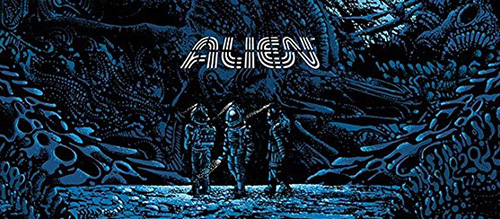Alien (1979) Retrospective Review
This article was written exclusively for The Film Magazine by Lucas Hill-Paul.
Alien (1979)
Director: Ridley Scott
Screenwriter: Dan O’Bannon
Starring: Sigourney Weaver, Tom Skerritt, Harry Dean Stanton, Veronica Cartwright, John Hurt, Ian Holm, Yaphet Kotto, Bolaji Badejo
Before Ridley Scott became one of the most reliable directors-for-hire in the business, he quickened the heartbeat of horror fans everywhere with his terrifically accomplished breakthrough, Alien. This isn’t to write Scott off as a jobbing filmmaker – what readers of Cahiers du Cinema and the like would call a metteur en scène – rather, Scott’s efficiency in shooting scripts to a deadline and delivering feats of visual mastery under budget places him in the rare camp of auteur sans ego, a problem-solver first and foremost bolstered by an unmatched eye for detail and a ruthless work ethic.
Scott, like James Cameron and George Lucas, has always been on the pulse of what visual effects can achieve, though tempered by a rare level-headedness perhaps not shared by his contemporaries. Think of how the exoskeletal augmentations of Aliens would eventually evolve into the mech-suit brawls of Cameron’s Avatar, while Scott, in contrast, would turn to spectral introspection with his eventual sequel/prequel Prometheus.
Alien is characteristically tactile, a visual marvel with an affinity for achievable minutiae. In the opening minutes, the interior of the Nostromo breathes to life with deceptively simple light and sound effects that seem to expand the claustrophobic set to feeling every bit the spaceward city represented by the exterior miniature. We talk about setting as character, but the Nostromo is not so much a personification of atmosphere as much as an anatomical cross-section.
I was lucky enough to catch a re-release of the film for its 40th anniversary with the kind collaboration of the BFI Southbank in London. What’s most striking about the crisp restoration is how every interior detail is lifted into stark relief – the walls sweat with steam and condensation, and wires and tubing spread through corridors like capillaries. One of its quieter moments follows the great Harry Dean Stanton taking an impromptu shower in the cargo bay, the ceiling from which it seems to be inexplicably raining.
The film, of course, is loaded with innuendo; much has already been said about its phallic predilections, the reverse penetration, conflating consumption with food and sex. The crew of seven is hunted and devoured through air vents that open and close like orifices by a creature that is both biologically perverse yet undeniably industrial. There’s a very good reason why the final scare comes when Sigourney Weaver’s Ripley mistakes the alien for an innocuous wall of her escape shuttle. Teaming with artist H.R Giger and set decorator Ian Whittaker, Scott envelops viewers with a paralysing fear of replacement, becoming expendable in favour of soulless mutations of machine and matter.
This being my fourth or fifth viewing of Alien, I’m now able to communicate better what exactly it is that scares me about it so much. Moreso than awakening subconscious biological repulsions of the other, or inherently masculine sexual insecurities, the key is in realising that the most frightening sequence is the revelation that Ash (an uncanny early performance from Ian Holm that wipes the floor with Michael Fassbender’s David) is an android. Any initial fears of a ravenous, acid-blooded carnivore with the deadly efficiency of a slaughterhouse are immediately trumped by the slow, unsettling drip of milky blood from Ash’s forehead. The creature, the mesh of flesh and artifice driven by inhuman consciousness, was, of course, onboard the whole time.
Despite its initially poor reception, Kubrick’s 2001: A Space Odyssey was still very much in the public consciousness, and it’s curious watching Scott, more than ten years later, playfully dangle the Nostromo’s onboard AI as a potential successor to HAL-9000. Teasingly named “Mother”, the system never speaks above a textual register, but does encase visitors within an embryonic room of blinking lights when it relays life-altering news with all the empathy of an unexpected phone bill. While Mother is never directly antagonistic, the computer earns every syllable of Ripley’s first use of her catchphrase, “You BITCH!” when it refuses to halt the ship’s impending self-destruction on a technicality. At every stage, computers and autonomous beings dictate the remaining life span of the ship’s crew to the second, and Ripley’s emergence as the eventual protagonist remains a glorious testament to human will.
Unfortunately, the film does remind modern viewers of the expectations of 70s horror filmmaking when Sigourney Weaver, seemingly scot-free, strips down to skimpy underwear. Defenders have retroactively explained the choice as an integral demonstration of vulnerability before the final action beat, but it’s hard not to read the lingering shots of the then unknown actress as eye candy intended as an award for the audience’s dogged determination to make it this far. While it’s not quite as gratuitous as other films of the decade (and, indeed, subsequent decades), and it’s tempting to encourage Weaver’s soft contours as a visual protest against the film’s thematically loaded body horror, I think we all breathe a sigh of relief when Ripley remains entirely fully clothed for the sequel.
Alien’s pairing of genuine, spine-tingling horror and thematic resonance put Ridley Scott on the map, and it’s frankly unfair that the masterful director was able to immediately follow-up with Blade Runner, another existential sci-fi classic. 40 years on, and it has remained one of his best, most invasive and obsessive films. It’s truly a testament that, despite Prometheus and Alien: Covenant’s irritating disposition to posit answers to questions never asked, every turned corner of that first nightmare invites mystery and intrigue. We still don’t really know where the aliens came from, and it’s for the best that we never find out.
22/24
You can support Lucas Hill-Paul at the following links:
Personal Twitter – @lucashpaul
You can find more of his writing at Film Daily News – @FilmDailyNews
Recommended for you: Alien Movie Franchise Ranked


